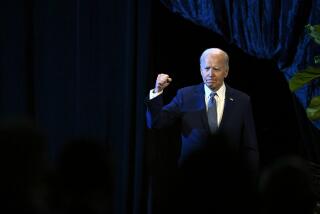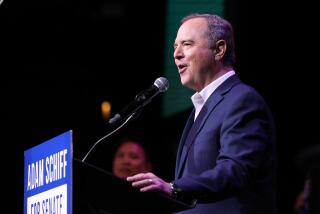Mike Huckabee’s exit: Which GOP candidate stands to gain?
- Share via
Reporting from Washington — Mike Huckabee’s sudden and surprising announcement over the weekend that he would not seek the presidency in 2012 has opened up the race and given new life to some potential contenders. So who does Huckabee’s exit help — and who does it hurt?
“I know I’m going to deeply disappoint a lot of people I love. It pains me to let them down,’’ Huckabee said on his eponymous Fox News show Saturday evening. “But I know my decision is going to delight just as many who aren’t that fond of me.’’
The former Arkansas governor had consistently been doing well in polls, typically running neck-and-neck with Mitt Romney. But since showing unexpected strength before bowing out in the 2008 presidential campaign, Huckabee has found a second career as an author, commentator and motivational speaker. He hinted at his ambivalence early this year, when he became one of the few Republicans to publicly acknowledge that defeating President Obama would be a formidable task, given his financial resources and the advantage of incumbency.
Huckabee burst onto the national scene in January 2008 with his shocking defeat of Romney in the Iowa caucuses, and his departure would seem to open up the state for just about almost everyone in the field. Along that line, Iowa Gov. Terry Branstad, a Republican, Monday called upon to GOP candidates to start campaigning in his state in earnest.
“I think we’ll look back at this and say this is the most wide open and competitive race we’ve ever had for the Iowa caucuses,” Branstad said at his weekly news conference.
So which candidate benefits from Huckabee’s decision? Here’s a look:
Tim Pawlenty. Still struggling to break out of the single digits in the national polls, the former Minnesota governor needed a break — and it looks like he’s gotten one. Hailing from a neighboring state, Pawlenty has been all-in on Iowa, and he seems to be in the best position, right now at least, to attract Huckabee caucus-goers. But there are questions whether the Christian conservatives who flocked to Huckabee, a former pastor, see Pawlenty as one of their own. That might provide a boost to ...
Michele Bachmann. The outspoken congresswoman, also from Minnesota, was born in Iowa, and has been spending a lot of time in the state — although she has yet to formally enter the race. She has the social conservative bona fides, having inveighed against same-sex unions in Minnesota. (Former Sen. Rick Santorum, similarly, will seek Huckabee’s supporters.) Unlike Huckabee, however, Bachmann is popular with the “tea party” movement. But there are questions about Bachmann’s national credentials, so that could play to the benefit of ...
Newt Gingrich. The former House speaker, who seems determined to cast himself as an independent thinker by, for example, bashing Rep. Paul Ryan’s Medicare plan, has been steadily wooing evangelical leaders in the state, and will start a campaign blitz there this week. But Gingrich doesn’t have the natural base of support among Christian conservatives that exists for someone like ...
Sarah Palin. Earlier this month, any number of consultants would have told you that the odds favored Huckabee jumping in the race and Palin staying out. But Huck has upended that equation. Were Palin to declare tomorrow, she would immediately become the favorite to win Iowa. But there remains little sign that she is building an organization in the state. The longer Palin, who casts a huge shadow over the field, stays out, the more it helps someone like ...
Mitch Daniels. The buzz is building around the Indiana governor, who with Huckabee gone, is now viewed by some conservatives who don’t favor Romney as perhaps the best hope to derail the former Massachusetts governor’s White House run. Daniels, a budget hawk who famously called for a “truce” on social issues within the GOP, doesn’t seem like an ideal choice in Iowa, but then, George H.W. Bush won there once. Daniels has remained coy about getting in, and if he stays out, then that would seemingly boost ...
Jon Huntsman. Like Daniels, Huntsman, the moderate former Utah governor, and Iowa don’t seem to be a very good match. Yet Huckabee’s exit does help the ex-Chinese ambassador, if only because the alternative would have made the field much more difficult for Huntsman to enter. The GOP race might have quickly turned into stratified one, with a Huckabee versus Romney bout at the top of the card. Now that won’t happen, which means that, in a way, you could argue that Huckabee’s decision hurts ...
Mitt Romney. Had Huckabee jumped in and the race evolved into a two-man battle (which also, by the way, would have been a heck of a feud, since these two camps don’t like each other), Romney may have been in a position to more clearly articulate his strengths as a candidate by way of contrast. It would also have given the media another top-tier target upon which to train its fire.
Now the field is likely to remain in a muddled state for quite some time — with Romney the putative front-runner and a favorite punching bag for other candidates. At the same time, the man who perhaps would have been Romney’s toughest adversary just threw in the towel, meaning that Romney could ultimately be the biggest beneficiary of Huckabee’s move. He could stand closer to the Republican nomination than ever.
Huckabee, of course, didn’t win the GOP nomination in 2008, John McCain did. In fact, Huckabee didn’t even win conservative South Carolina in the primary a few weeks after Iowa; McCain squeaked it out. It’s a reminder that while winning Iowa can extend the life of a campaign, it also very often doesn’t mean much more than that.
But if you were looking for signs that the race is about heat up in a significant way, Huckabee’s move this weekend was akin to flashing green light. Candidates, start your engines.
james.oliphant@latimes.com
More to Read
Get the L.A. Times Politics newsletter
Deeply reported insights into legislation, politics and policy from Sacramento, Washington and beyond. In your inbox twice per week.
You may occasionally receive promotional content from the Los Angeles Times.










